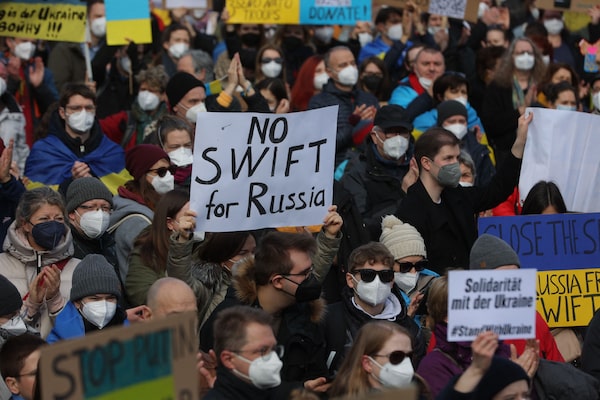
A protester holds a placard reading 'No SWIFT for Russia' during a rally against Russia's invasion of Ukraine on Feb. 26, in Frankfurt am Main, western Germany.YANN SCHREIBER/AFP/Getty Images
Canada and key Western allies say they are taking steps to block some Russian banks from accessing the SWIFT international payment system, in a move designed to bolster earlier punitive actions against Moscow for its ongoing military assault on Ukraine.
“Russia’s war represents an assault on fundamental international rules and norms that have prevailed since the Second World War, which we are committed to defending,” a joint statement from the European Commission, France, Germany, Italy, the United Kingdom, Canada and the United States said Saturday night.
“We will hold Russia to account and collectively ensure that this war is a strategic failure for Putin.”
A SWIFT primer as West moves to ice Russia out of international payments
Poland opens its arms and heart to Ukrainians fleeing the Russian invasion
The joint statement said the same group of allies would restrict the Russian central bank’s access to international reserves so that it could not use them “in ways that undermine the impact of our sanctions.”
SWIFT, or the “Society for Worldwide Interbank Financial Telecommunication,” is a secure-messaging network that facilitates rapid cross-border payments, making it a crucial mechanism for international trade.
Canada strongly supports removing Russian banks from SWIFT and targeting and restricting Putin’s war chest - the reserves of the Russian Central Bank. President Putin’s invasion cannot be allowed to succeed. We stand with the brave people of Ukraine. https://t.co/Zxl0FONTP3
— Chrystia Freeland (@cafreeland) February 26, 2022
The statement said the countries “commit to ensuring that selected Russian banks are removed from the SWIFT messaging system. This will ensure that these banks are disconnected from the international financial system and harm their ability to operate globally.”
The SWIFT international payments system said on Saturday it was preparing to implement the new measures in the coming days. ”We are engaging with European authorities to understand the details of the entities that will be subject to the new measures and we are preparing to comply upon legal instruction,” it said in a statement.
The new measures will be implemented in the coming days, and include restrictions on Russia’s central bank.
The West wants to prevent Putin from accessing $630 billion in foreign currency reserves he could use to finance his war and prop up a plunging rouble.
Canada’s Deputy Prime Minister, Chrystia Freeland, said in a statement on Twitter that the new sanctions are aimed at sabotaging Russian President Vladimir Putin’s attack.
“Canada strongly supports removing Russian banks from SWIFT and targeting and restricting Putin’s war chest – the reserves of the Russian Central Bank. President Putin’s invasion cannot be allowed to succeed. We stand with the brave people of Ukraine.”
The Canadian government joined allies on Thursday in imposing an earlier set of sanctions on several Russian banks and individuals. Ottawa also placed bans on exports of high-tech products to Russia.
On Friday, Prime Minister Justin Trudeau publicly called for Russia to be cut off from the international payment system, placing him among the most vocal proponents of the measure among Group of Seven leaders. British Prime Minister Boris Johnson also favoured ejecting Russia from SWIFT.
The European Union, led by Germany, had been the most opposed. The EU imports significant amounts of Russian oil, gas and wheat, and makes payments for those goods through SWIFT.
Two senior Canadian government officials said Ms. Freeland had been working the phones since Tuesday to plead the case to the Americans for the need to sanction Russia’s central bank. She also sent a paper outlining a proposal to the U.S. administration on Thursday, the sources said. The bank has more than US$640-billion in foreign exchange reserves, the Washington Post reported.
The same officials said the Prime Minister spoke to a number of European leaders on Friday and Saturday to build support. The Globe is not identifying the sources because they were not authorized to speak publicly on the matter.
The coalition of countries also said they will take action to stop wealthy Russians linked to the Kremlin from seeking safe haven abroad.
“We commit to acting against the people and entities who facilitate the war in Ukraine and the harmful activities of the Russian government. Specifically, we commit to taking measures to limit the sale of citizenship – so-called golden passports – that let wealthy Russians connected to the Russian government become citizens of our countries and gain access to our financial systems,” the joint statement said.
Kyiv’s mayor, Vitali Klitschko, said on Saturday that there was no major Russian military presence in the Ukrainian capital, but that saboteur groups were active and he was imposing a curfew from Saturday evening until Monday morning.
Authorities have handed thousands of assault rifles to residents and told them to make petrol bombs to help repel Russian troops.
With reports from Reuters and Adrian Morrow in Washington
Our Morning Update and Evening Update newsletters are written by Globe editors, giving you a concise summary of the day’s most important headlines. Sign up today.
 Steven Chase
Steven Chase Robert Fife
Robert Fife